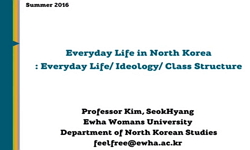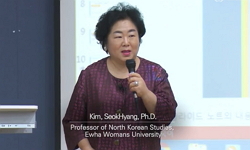This study explores North Korea’s trade patterns and the effectiveness of economic sanctions imposed on the hermit kingdom. Using a gravity model with a panel dataset of the country’s 92 trading countries from the period of 1999 to 2014, this pape...
http://chineseinput.net/에서 pinyin(병음)방식으로 중국어를 변환할 수 있습니다.
변환된 중국어를 복사하여 사용하시면 됩니다.
- 中文 을 입력하시려면 zhongwen을 입력하시고 space를누르시면됩니다.
- 北京 을 입력하시려면 beijing을 입력하시고 space를 누르시면 됩니다.


Effectiveness of Economic Sanctions against North Korea and Role of China : Empirical Approach
한글로보기https://www.riss.kr/link?id=A103226308
- 저자
- 발행기관
- 학술지명
- 권호사항
-
발행연도
2017
-
작성언어
-
- 주제어
-
KDC
325
-
등재정보
SCOPUS,KCI등재
-
자료형태
학술저널
-
수록면
8-15(8쪽)
- 제공처
-
0
상세조회 -
0
다운로드
부가정보
다국어 초록 (Multilingual Abstract)
This study explores North Korea’s trade patterns and the effectiveness of economic sanctions imposed on the hermit kingdom. Using a gravity model with a panel dataset of the country’s 92 trading countries from the period of 1999 to 2014, this paper examines North Korea’s trade patterns and compares the model-based estimated bilateral trade flows with actual trade ones. Main findings are: (1) North Korea’s trade has been excessively skewed to China as a result of economic sanctions from the United Nations and international community, largely driven by the United States; (2) The U.S. - North Korea trade would not be seriously affected by the sanctions due to their low estimated trade flows; (3) The latter finding raises further questions over the effectiveness of the current sanctions and asks for active cooperation from China.
목차 (Table of Contents)
- Abstract
- Ⅰ. Description
- Ⅱ. Basic Results
- Ⅲ. Robustness Checks
- Ⅳ. Conclusion
- Abstract
- Ⅰ. Description
- Ⅱ. Basic Results
- Ⅲ. Robustness Checks
- Ⅳ. Conclusion
- References
동일학술지(권/호) 다른 논문
-
An Intelligent System for Business Data Mining
- People&Global Business Association
- Shian Chang Huang
- 2017
- SCOPUS,KCI등재
-
- People&Global Business Association
- Hong min Chun
- 2017
- SCOPUS,KCI등재
-
- 사람과세계경영학회
- Jaka Winarna
- 2017
- SCOPUS,KCI등재
-
Discursive (de)legitimation of a contested return of former chairman Lee Kun-Hee to Samsung chaebol
- People&Global Business Association
- Kim Seung Jin
- 2017
- SCOPUS,KCI등재




 스콜라
스콜라





